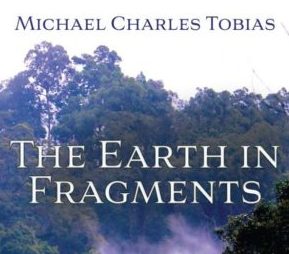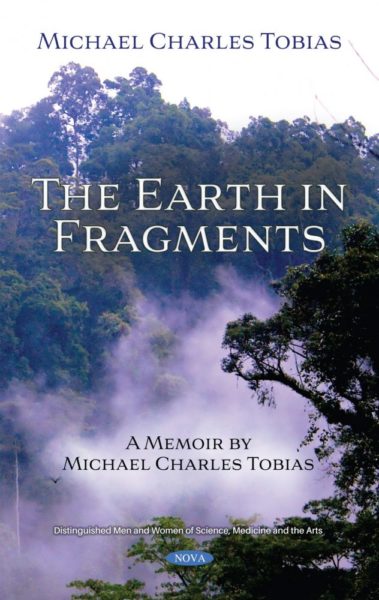Author(s): Michael Bostick
The Epitome of Naked Idealism: The Rare and Endangered Life of Michael Tobias
A Review of “The Earth in Fragments: A Memoir”, by Michael Charles Tobias
By Michael Bostick
To most mere mortals, like myself, reading any one of the countless books by the madly prolific writer/ecologist, Michael Charles Tobias, is an exercise in mental and philosophical acuity that few of us can achieve without a yogic degree of transmogrification – and sheer discipline. Yet, as difficult as it is to stretch one’s rather stiff, if unimaginative mind into the contorted configurations that Tobias’ acrobatic writing and ideas demands its readers, to attempt his latest book, and perhaps his most accessible, “The Earth in Fragments,” is ultimately, an essential task – and well worth the effort.
Having followed his storied, unparalleled writing and filmmaking career with breathless wonder, “The Earth in Fragments” is the natural history of Michael Tobias’ improbable, if frenetic leaps and bounds to save the planet at all costs. The book breaks down each bivouac of his tireless, and apparently sleepless series of first ascents, both actual and metaphoric, to overcome the relentless steepness of earth’s perilously fragile ecological tipping point. From his early childhood dismay of zoo confinement to his current piercing analysis of an over-wrought state of the biological world, Tobias provides a vulnerable look into what has driven his deep, lifelong and insatiable passion to discover a way forward for humankind.
What is quickly revealed, as each chapter describes one quixotic scaling of ramparts after the next, is the culmination of an extraordinary life revealing a rare, remarkably gifted Mind that precious few possess.
“The Earth in Fragments” is a sampler, an anthology of sorts of Tobias’ vast literary and heroic global film projects, wherein he undertakes any and all measures to free the earth from human exploitation, affliction and bondage. In this respect, the “earth” is mostly represented by the innocents, the animals – both wild and domestic, the “Others,” and their precious, disappearing habitats. Tobias unstintingly and painfully crystalizes and reveals our inexplicable penchant to destroy nature, which is to destroy ourselves – most immediately and viscerally demonstrated by our compulsive thirst to kill. Tobias persists in that we realize irrevocably our ecopsychological obligation to all species, all sentient beings, and critically activate a latent consciousness of our compassion instinct, our foundational ethical belonging to nature, and transform the depths or our self-inflicted zeal to foment death and destruction in our wake.
To enter into the realm of any work by Tobias, fiction or non-fiction, is to be led on a fantastic journey into a remote overgrown temple of a towering intellect, discovering beyond the darkness an Arcadia, a critical focal point of hope, perched perilously, if confoundingly on the edge of one’s capacity to decipher the waterfall-like origins of Gaia consciousness itself. His heavily researched and remarkably original thinking, his deft mastery of language and world literature, artistic and scientific, his incomparable breadth of knowledge of the world’s transcendent and stricken places – is stupefyingly humbling, if challenging, to behold. More importantly, he never lets the reader lose sight that our simple, unseen yet purposeful empathic actions are the key to healing ourselves and the earth.
Reading Tobias requires deep concentration and gestation. Often, I found that I had to read a paragraph 3-4 times over, just to fully absorb the unseen intricacies of both his precise yet poetically worded meaning and intent. As well, it can be disturbingly unsettling to read the urgency of Tobias’ relentless inquest, at this critical juncture ahead of the earth’s 6th mass extinction, the apparent fate of the Anthropocene, as he assiduously lays out why we as a species must learn to respect, understand and engage the bio-diverse majesty of the Others and their habitats to save ourselves.
Tobias dignifies his readers with the presumption that they are versed, if not literate in such concepts as anthrozoology, biophilia, physiolatry, psycholinguistics, ethology, or biosemiotics as a starting point for distinguishing basic factors of our plight. His erudition and disparate references to obscure influences is mind boggling. His desperate dictate commands us to cross seeming unattainable thresholds to not just survive the odious consequences of our carelessness but paradigmatically alter the very basis of who we are as supposedly conscience-driven individuals.
Tobias unveils a life of both extreme ascetic contemplation as well as a man of unfathomable action. His travels and travails, his ambitious achievements, and failures, his wild idealism and fearless engaging of both the powerful and the meek, are truly breathtaking. Anyone reading this summation of a life would likely be reminded of the Nikos Kazantzakis character of Zorba the Greek, and his famous declaration upon his death that “a man like me should live a thousand years!” Tobias is likewise such an aging Zorba but his message is even a thousand times more compelling as we face the wanton destruction of millions of years of meticulous evolution which, as he has so eloquently poured forth, our future portends.
You can read more about The Earth in Fragments here.
Michael Bostick is an environmental professional, artist and freelance writer.
The views and opinions expressed through the MAHB Website are those of the contributing authors and do not necessarily reflect an official position of the MAHB. The MAHB aims to share a range of perspectives and welcomes the discussions that they prompt.


